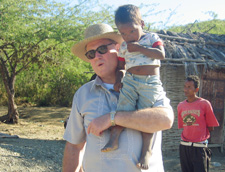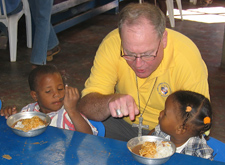January 13Catholic HeraldFeatured Article
Dominican Republic trip inspires Archbishop Dolan
Sees faith, stewardship at work in sister parish
By Maryangela Layman Román, Catholic Herald Staff

ST. FRANCIS — With Archbishop Timothy M. Dolan, enthusiasm is rarely in short supply. These days, Milwaukee’s archbishop is more impassioned than ever, bursting with stories to share following a six-day trip to the archdiocese’s sister parish, La Sagrada Familia in the Dominican Republic.
“I have to tell you I am so impressed, inspired and proud. La Sagrada Familia is a real credit to the entire Archdiocese of Milwaukee,” he said in an interview with the Catholic Herald last Friday, the day after he returned from his first visit to the archdiocese’s mission parish in the Diocese of San Juan de la Maguana. Accompanying Archbishop Dolan on the trip was Fr. Jerry Herda, secretary to the archbishop.
Paraphrasing a Spanish saying in English, Archbishop Dolan said, “If something is not in your eyes, it cannot be in your heart. Well, the parish has always been in my mind, but now it’s also in my heart and I will constantly be thinking of ways we can help.”
What Archbishop Dolan saw firsthand last week was the 60,000-member parish in one of the Dominican Republic’s poorest regions. Included in the parish are a main parish center in Sabana Yegua; a nutrition center that serves a daily meal to 200 to 300 children under age 5; a health center that includes a clinic and pharmacy and 25 smaller villages also served by the parish. Most villages have small chapels where Mass is celebrated once a month.
Poverty no obstacle to generosity

But more than the physical layout, it was the people that left the archbishop bursting with stories to share.
For example, he said he was deeply moved when a lay leader of this poor parish, located in a place where people live in small, dirt floor huts without latrines, announced a collection would be taken up to help victims of the Asian tsunami rebuild their lives. While the amount collected may have totaled only a few dollars, Archbishop Dolan said the gesture itself spoke volumes.
He also saw a community embrace an orphaned 12-year-old boy with cerebral palsy. A few years ago, when parish priests were visiting his home and talking with his mother, they were startled when the naked boy seemed to crawl out from no where. Unable to walk or talk, the boy was obviously loved by his mother, yet, she didn’t know how to get him necessary help. With assistance from the parish priests, the boy has since learned to walk and is beginning to talk. But now that his mother has died, he’ll need a caregiver. A lay leader in the parish spoke to the congregation at Mass saying, “You must take care of her boy. She loved him very much and we must also love him.”
Finally, Archbishop Dolan said, a woman stepped forward and agreed to care for the youngster with so many special needs, showing how the community cares for each of its members, even the most vulnerable.
Fig trees show ‘stewardship of earth’
He said he saw signs of the archdiocese’s outreach to the Dominicans on the faces of so many children who wore glasses provided by the clinic and in the many fig trees sprouting around the diocese.
The trees are the brainchild of Fr. Martí Colom who along with Fr. Oriol Regales staffs the parish. Members of the Missionary Community of St. Paul the Apostle and Mary, Mother of the Church and priests of the Archdiocese of Milwaukee, they are also natives of Spain.
Fr. Colom imported the trees from Spain and has created an orchard on a third of an acre of land near the parish center. He has also distributed the trees to parishioners in the hopes of teaching them to diversify their crops from the standard bananas and tomatoes, explained Archbishop Dolan.
“Everywhere I went, people proudly pointed to their fig tree,” he noted, explaining the tree grows well in the climate.
“I am so proud that they are teaching the people a stewardship of the earth,” he said. The figs produced by the trees cultivated by Fr. Colom are served at the nutrition center. The priests are also teaching the people to harvest honey as a way to generate income, another new skill the archbishop described as “a beautiful stewardship where the missionaries are helping the people so much.”
Describing the priests as “missionaries in the purest sense,” Archbishop Dolan said, like their predecessors, the priests aim to meet the needs of the people “soul, mind and body. The church is not just the spiritual center,” he said.
He called it “a wonderful example of Catholic wisdom of grace building a nation.”
Need for evangelization great

Interestingly, Archbishop Dolan noted, the Dominican diocese is the birthplace of Catholicism in the New World, as it was where Christopher Columbus arrived in 1502.
But even though the Catholic faith is 500 years old in this part of the world, Archbishop Dolan said much evangelization needs to take place. While most Dominicans consider themselves Catholics, there is a vague understanding of Catholicism, he explained. For example, he noted an experience Fr. Colom recently had at a church in one of the small villages. He asked how many of the people were baptized. The answer was very few and many people looked puzzled that the priest had posed the question.
They assured him they were believers, they considered themselves Catholics, but were not formally baptized. Fr. Colom plans to return soon to baptize the people, but Archbishop Dolan noted the example highlights a need for catechesis and evangelization.
The archbishop said that the Spanish lessons he took last summer in Mexico helped him considerably and that he celebrated Mass and delivered his homily in Spanish, but that in-depth conversations are still difficult.
At the end of one homily, he said, he couldn’t help but interject some of his trademark humor.
He thanked the congregants for putting up with his Spanish, but noted that perhaps his Americanized Spanish was easier to understand than the Spanish of the two Spanish natives.
As he traveled around the diocese, Archbishop Dolan saw numerous examples of the high regard which with the Dominicans have for people from the Milwaukee Archdiocese.
Fr. Jerome Thompson, the archdiocesan priest who died suddenly in May 2003 as he was returning to pastor the parish, is remembered through holy cards and photos. So many people Archbishop Dolan met spoke highly of Archbishop Rembert G. Weakland, Bishop Richard J. Sklba, and members of the archdiocesan office for world mission, Dominican Sr. Rosemary Huddleston and Franciscan Sr. Frances Cunningham.
Relationship began 24 years ago
The relationship between the dioceses began nearly 24 years ago at the suggestion of Milwaukee native Archbishop James M. Harvey, prefect of the papal household. Then a member of the Vatican’s diplomatic service who was working at the papal nunciature in the Dominican Republic, Archbishop Harvey suggested to Archbishop Weakland that the archdiocese form a relationship with the Dominican parish. Archbishop Weakland agreed and over the years, the parish has been staffed by Milwaukee archdiocesan priests. Individual parishes in the archdiocese donate money and resources to the Dominican parish, and annually the office for world mission organizes a pilgrimage to the parish. The world mission office pays the salaries of the priests and gives the parish a monthly budget allowance.
Archbishop Dolan hopes to send a large delegation from the archdiocese to the Dominican Republic in 2005 to mark the 25th anniversary of the relationship.
“I take my hat off to the world mission office. They are real examples of solidarity, the love that bonds us together,” he said, adding that assisting the parish is living out the essentials of the Catholic faith. “... to go beyond ourselves to have a real bond of solidarity with the church in this hemisphere is right at the essentials of our Catholic identity. For me, it’s a no brainer for us as an archdiocese to share with them,” he said. “And I believe that whatever we give, comes back to us. God is never outdone in his generosity and I firmly believe he will continue to help us.”
Be An Informed Catholic!
For the rest of this week's news, visit the Catholic Herald web site.
Click here to subscribe to the Catholic Herald.
|